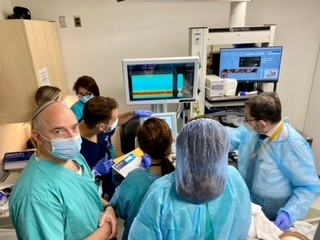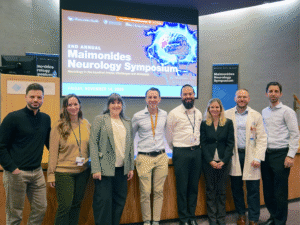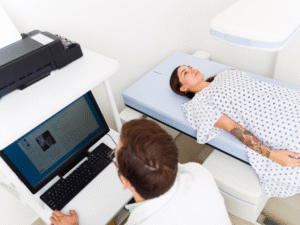For patients who have gastrointestinal or digestive problems, daily activities can be difficult. And these conditions are a concern for a vast number of people. According to the National Institute of Diabetes and Digestive and Kidney Diseases, between 60 million and 70 million Americans have some type of digestive disease.* Treating these conditions is vital to improving their health and enhancing their quality of life.
To address these critical needs, Maimonides Medical Center established Brooklyn’s only Neurogastroenterology and Gastrointestinal (GI) Motility Center — a center of excellence that brings together specialized expertise, advanced diagnostics, leading-edge equipment, and innovative treatments for GI disorders in one convenient location. This comprehensive approach ensures patients receive exceptional care tailored to their needs.
“We provide a wide range of services to treat the full spectrum of motility issues all under one roof,” says Aaron Tokayer, MD, Director of the GI Motility Center. “From swallowing and esophageal disorders to gastric, colonic and defecatory motility issues, we handle everything — testing, diagnosis, and treatment — at our center, streamlining the process and enhancing the patient experience by eliminating the need for multiple visits to different locations.”
Advanced Diagnostics for Complex GI Disorders
For patients who struggle with GI disorders, obtaining an accurate diagnosis can often be a challenging and prolonged process. Some patients have complex diseases that mimic more common conditions like acid reflux, making it difficult to pinpoint the actual problem. Others may not respond well to first-line, go-to treatments.
At the GI Motility Center, a multidisciplinary team of specialists collaborate to get the answers patients need. This team includes board-certified experts in GI motility, cardiothoracic surgery, nutrition, speech and swallowing pathology, and pelvic floor care. Together, they take a systematic approach to identifying the underlying cause behind each patient’s symptoms.
“Many patients arrive with a misdiagnosis or they haven’t responded well to the usual treatments,” explains Dr. Tokayer. “We pay attention to details in our office visits and conduct a thorough evaluation. Assessing our patients based on the complete description of their symptoms helps us identify their specific disorder and deliver targeted treatments.”
Alongside these assessments, Maimonides experts leverage leading-edge diagnostic tools to measure a patient’s GI muscle strength and pinpoint structural abnormalities. These tools can include:
- Barium X-rays
- Bravo testing (wireless capsule pH reflux testing)
- EndoFLIP: In 2022, Maimonides was the first hospital in Brooklyn to perform an EndoFLIP examination.
- Endoscopy
- Gastric, nuclear or whole-gut emptying scans
- Manometry (anorectal and high resolution)
Even though GI disorders can be uncomfortable and distressing, this kind of specialty care isn’t for everyone. Dr. Tokayer recommends that referring providers consider patients for the GI Motility Center if they need confirmation of a suspected diagnosis or if patients:
- Do not respond to standard treatments
- Exhibit atypical or unusual symptoms
Comprehensive Motility Care, Tailored to Patients’ Needs
Patients who come to Maimonides for GI motility care can benefit from a full spectrum of treatment options that range from conservative approaches to advanced and innovative interventions.
“We excel in treating everything from simple reflux to more complex, involved conditions like a gastric junction outlet obstruction,” Dr. Tokayer says. “With every patient, we start with the most conservative treatment options available and intensify their therapy as they need more aggressive interventions.”
As a first step, Maimonides specialists prioritize conservative options, including:
- Behavior modification
- Dietary changes
- Eating pattern changes (methods and timing of eating)
- Neural modulators (medications that impact coordination of GI muscles)
However, some patients need more advanced interventions. The GI Motility Center offers a full spectrum of minimally invasive surgical procedures to address their needs, including several that are unique to Maimonides in the area. Through multidisciplinary partnerships, Maimonides provides cutting-edge interventions such as:
- Gastric stimulators: Surgeons place this implantable gastric pacemaker in the patient’s abdomen. It sends electrical impulses that trigger the stomach to function correctly.
- G-POEMS: This procedure treats gastroparesis, a condition where the patient’s stomach doesn’t empty completely. It involves making a permanent cut to relax the muscle between the stomach and small intestines.
- Transoral incisionless fundoplication (TIFF): This endoscopic procedure treats both gastroesophageal reflux disease (GERD) and a hiatal hernia. Surgeons rebuild the valve at the top of the patient’s stomach to prevent heartburn and regurgitation.
Partnering with referring physicians for continuity of care
As Brooklyn’s only GI motility center, Maimonides offers access to the most advanced, innovative treatment options, which benefits community-based providers and their patients.
“Having access to GI motility care at Maimonides is beneficial for referring physicians because they can connect their patients to specialized services right here in Brooklyn,” Dr. Tokayer says. “Not only do they ensure their patients receive specialized, high-quality care but through open channels of communication, the referring physicians also remain actively involved in the treatment process maintaining continuity of care.”
And for patients who struggle with GI conditions daily, having this level of care close to home can substantially improve their quality of life.
“Many patients come to us in extreme distress and frustration. They’ve often seen multiple physicians, have been through many evaluations and treatments, but they still don’t feel well,” Dr. Tokayer says. “We can often help these patients, those who failed to respond to more routine therapies. You can imagine the relief and satisfaction when we accurately diagnose and deliver targeted therapy that may be more effective than previous treatments.”
Chronic constipation, defecatory disorders, physical incontinence, IBS, and chronic abdominal pain syndrome can also be treated with multimodal and interdisciplinary approaches that include dietary and behavior modifications, appropriate testing, physical therapy, pharmacologic and neuromodulation, and occasionally more aggressive or surgical interventions. At Maimonides Center for Neurogastroenterology and GI Motility, we incorporate a multi-dimensional approach for patient care and satisfaction for patients suffering from these disorders, as well as their referring providers.
Learn more about Maimonides’ Neurogastroenterology and Gastrointestinal (GI) Motility Center at https://maimo.org/treatments-care/gastroenterology/gi-motility-center/. To refer a patient, call 718-283-5900.
*https://www.niddk.nih.gov/health-information/health-statistics/digestive-diseases




